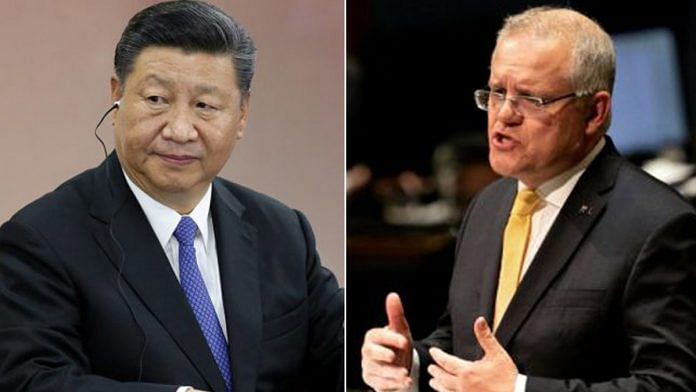New Delhi: In the past few months, the relations between China and Australia have steadily deteriorated. It all began after Australia, along with western countries like the US and the UK, called out Chinese curbs in Hong Kong on 19 November. In response, China issued a 14-point “chargesheet” attacking Australia.
This diplomatic dispute escalated Monday after a spokesperson for the Chinese government, Zhou Lijan, tweeted a doctored photograph of an Australian soldier holding a knife to an Afghan child’s throat.
In episode 623 of ‘Cut The Clutter’, Shekhar Gupta looks at the deepening conflict between the two countries and the reason behind China’s provocation.
Shocked by murder of Afghan civilians & prisoners by Australian soldiers. We strongly condemn such acts, &call for holding them accountable. pic.twitter.com/GYOaucoL5D
— Lijian Zhao 赵立坚 (@zlj517) November 30, 2020
The tweet by the Chinese spokesperson was in response to the recent revelation that the Australian army was involved in the killing of innocent Afghans during their tour of duty in the country.
A report released by the Australian Defence Force revealed that there was “credible evidence” that Australian Special Forces, called SAS in the country, unlawfully killed 39 Afghans civilians from 2009-2013.
“It is said that some of those killings were just for fun,” said Gupta.
While the image of the soldier holding the Afghan child does seem morphed, the Chinese, according to Gupta, have “turned the knife in Australia’s heart”.
The Australians have issued an angry statement and called the picture “falsified, repugnant and offensive”. They have also demanded an apology from China.
Also read: China’s ‘wolf warrior’ diplomats slam Australia, win fans at home
How such cases of murders came to light
The report was revealed after four years of inquiry by Major General Justice Paul Brereton, a judge and officer in the Australian Army Reserve, after whistleblower accounts and media reports about these killings began circulating in 2016.
He examined 20,000 documents, 25,000 images, and 423 witnesses and, in 2020, confirmed the brutal murder of at least 39 Afghan civilians in 23 incidents.
He described it as a disgraceful and profound betrayal of Australian Defence Forces. He’s also named 25 perpetrators besides many accessories who helped them.
Another case of misconduct by Australian soldiers, which was not mentioned in his report but has been doing rounds is the image of an Australian soldier drinking beer from a prosthetic limb of a Taliban soldier.
“Now that is not conduct that any professional army can be proud of. In fact, that is not conduct that any professional army will not be ashamed of,” said Gupta.
The report filed by General Brereton also mentions that such acts are in violation of Section 268, Point 81 of the Commonwealth Criminal Code. According to the code, pillaging the property of someone you have killed or captured attracts a jail sentence of 20 years.
The Australian government has also decided to investigate 19 soldiers and ordered the dismissal of 13.
Australia’s Defence Forces chief General Angus Campbell and Prime Minister Scott Morrison apologised in public. Morrison also called his Afghan counterpart Ashraf Ghani and apologised to him, promising to bring justice to the Afghans.
Also read: China’s fight with Australia might backfire as Joe Biden is looking to unite US allies
China and Australia caught in ‘Thucydides trap’
Even though Australia investigated its own army and came clean about it, the Chinese attacked the country.
Gupta cites an article in the South China Morning Post by journalist Alex Lo, who said that the two countries were actually caught in a ‘Thucydides trap’. Thucydides was a fifth century BC Greek philosopher.
The term ‘Thucydides trap’, coined by American political scientist Graham T. Allison, refers to a situation when an emerging power threatens to displace an existing great power. In such a situation, war becomes inevitable.
Gupta quoted Lo as saying, “While Australia may geographically be in the east, ideologically it finds its alliance with countries like the USA, Britain and Canada. But over the last few years, Australia has become dependent on China for its trade.”
“If the Chinese want to strangle Australia, they can reduce their trade with Australia which would take away six percentage points from Australia’s GDP and 14.5 per cent of their spending surpluses. In contrast, what will happen to China will be small — they will lose 0.5 per cent of their GDP, and maybe 2.5 per cent of their citizens’ average spending surplus.,” he added.
Earlier, China was dependent on Australia for the import of bauxite but that has also now changed after China started sourcing it from Africa. This puts Australia in a difficult position.
In conclusion, Gupta quotes Lo, who wrote: “The Australians are now realizing that in this bargain, they have lost their best customer and in return, won their worst enemy.”
Watch the latest episode of CTC here:



